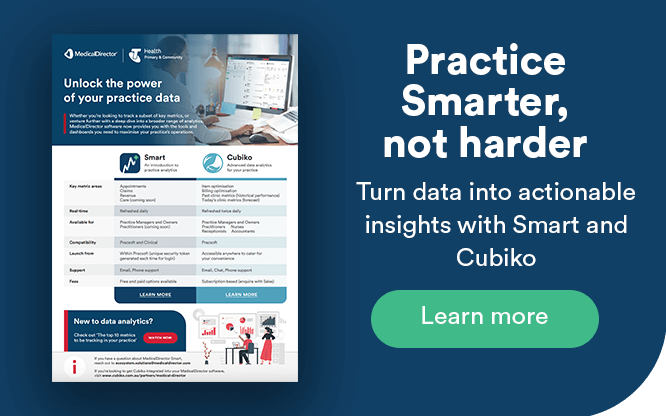How SMS in Healthcare Improves Patient Communications
Remember when appointment reminders were on pieces of cardboard and recalls were sent via snail mail? Ahh, the good old days.
Well, believe it or not, healthcare practices first started sending reminders and recalls digitally over a decade ago. In that time, some have jumped on the text messaging bandwagon more than others.
SMS appointment reminders are just the start. How else can GPs, specialists, nurses and other health professionals use SMS to deliver safe and efficient care?
We picked the brains of Kylie Goodwin from MedicalDirector, and Michael Petrowski, Head of Account Development at MessageNet, to find out.

Sending SMS Messages Reduces Missed Appointments
The cost of a missed appointment or no-shows isn’t just an empty slot. It’s revenue that evaporates into thin air, alongside resources that could’ve gone towards treating someone else, explains Kylie.
Missing an appointment is just as frustrating for patients too – particularly if they need to see a specialist.
Kylie says using SMS to send appointment reminders is one of the quickest ways to improve practice efficiency because it can be automated. And the stats show that texts achieve cut-through.
“Ninety per cent of texts are opened within 90 seconds,” says Michael. “There are a million different ways you can communicate with people, but they’re busy, and speaking to them directly is critical to their care.”
“The real power of SMS lies in its ability to make health care a seamless part of a patient’s daily life,” adds Kylie.
What does that look like? Practices can use SMS to keep patients updated about their prescriptions, follow-up appointments and test results.
Another option? Getting to know new patients – before they’ve stepped through your practice door.
“You could use SMS to send new patients any relevant forms to fill out ahead of time. You’re likely to get more detailed information about any current symptoms or medication, plus they’ll spend less time in the waiting room,” says Kylie.

SMS to confirm appointment attendance
Sending someone an appointment reminder is great, but how do you know if they’re going to turn up? You have to ask them.
That’s where two-way SMS can help practices improve scheduling and reduce no-shows even further. And yes, it can be as simple as confirming yes or no.
SMS lets you communicate with patients more regularly – and in a more conversational way. But that doesn’t necessarily mean more work.
In fact, it’s the complete opposite.
“With an SMS platform that integrates with your practice management software, you can set up a whole range of automated workflows using pre-set templates and send bulk SMS campaigns to thousands of people at once,” explains Mike.
Healthcare SMS for monitoring patient conditions
When was the last time you had a headache or a nosebleed – can you remember? Neither can we. Accurate patient data are critical for providing effective treatment plans. But the reality is, most people don’t pay attention – until it’s too late.
That’s where Kylie believes SMS can be a game-changer for documenting those important health moments.
“By using the immediacy and accessibility of SMS, you’re not just reminding patients about their health – you’re actively involving them in it. And, with more comprehensive health records, health professionals can provide more personalised and effective health care,” she says.
How about care planning for chronic diseases? Yep, SMS can help you there too.
Two-way SMS can be an easy way to connect with patients with a chronic disease and update their care plans when they’re due for review. They can let you know about any changes in their condition or the effectiveness of a treatment. The result? Better health outcomes for at-risk patients. Winning!
But what is it about SMS that makes doing this record-keeping easier than other channels?
“The beauty of SMS is its simplicity. The interface very rarely changes and how you use it always stays the same, which is why it’s so effective and why people of all ages respond so quickly,” Mike says.

SMS messaging tips for healthcare providers
There are ways SMS can speed up the enrolment process for new patients. But what about those already in your care? Yep, SMS can help you there too.
Here are some of Kylie’s suggestions:
- Send an automated check-in text message every few months and ask if any contact details have changed. Patients can be directed to a simple online form setup by their practice to complete.
- Use bulk SMS reminders to remind patients your practice will be closed for the holidays.
- Work towards meeting practice targets by generating awareness and education on key health initiatives.
- Encourage eligible patients to register for MyMedicare with your practice. More on that here.
If you’re not sure where to start with SMS, Kylie recommends starting small and focusing on the areas your practice needs to improve the most.
“At MedicalDirector, we’ve spent the last three decades helping medical centres and GPs run their practices more efficiently and improve patient care and communication by using software,” she says. “It’s about finding what works best for you and your team.”
In healthcare, every second counts. Discover how software can help improve the way your practice communicates with patients. Chat with MedicalDirector today about MessageNet.
Discover more about SMS healthcare communication with our Ultimate Guide to SMS, free to download.










